Gardening in Chapel Hill: Cultivating Beauty and Sustainability
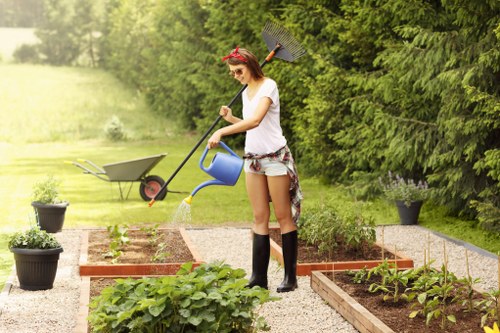
Introduction to Gardening in Chapel Hill
Chapel Hill, nestled in the heart of North Carolina, is renowned for its vibrant community and lush landscapes. Gardening in this region offers residents a unique opportunity to connect with nature, enhance their homes, and contribute to a sustainable environment. Whether you're a seasoned gardener or a novice, Chapel Hill's climate and soil conditions provide an ideal setting for a diverse array of plants.
With a rich history of horticulture and a supportive local community, Chapel Hill is a haven for garden enthusiasts. The area's commitment to green spaces and environmental stewardship makes it an excellent place to cultivate beautiful and sustainable gardens. From colorful flower beds to thriving vegetable patches, gardening in Chapel Hill can transform any outdoor space into a personal oasis.
In this article, we will explore the best practices for gardening in Chapel Hill, highlight the unique features of the local climate, and provide tips on selecting the right plants for your garden. We will also delve into the top gardening services available in the area and discuss how to make the most of the surrounding neighborhoods to enhance your gardening experience.
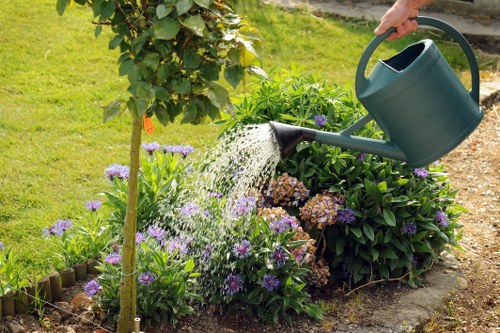
The Climate and Soil of Chapel Hill
Understanding the local climate is crucial for successful gardening in Chapel Hill. The region experiences a humid subtropical climate, characterized by hot summers, mild winters, and ample rainfall throughout the year. This climate allows for a long growing season, enabling gardeners to cultivate a wide variety of plants, including both annuals and perennials.
The soil in Chapel Hill is predominantly sandy loam, which offers excellent drainage and aeration. However, it can be prone to nutrient deficiencies, so incorporating organic matter such as compost can enhance soil fertility and structure. Regular soil testing is recommended to determine the specific nutrient needs of your garden and to adjust your fertilization practices accordingly.
Additionally, Chapel Hill's climate supports a diverse range of plant species, from native wildflowers to ornamental shrubs and trees. Selecting plants that are well-suited to the local environment will not only thrive but also contribute to the area's biodiversity. It's essential to consider factors such as sunlight exposure, water availability, and plant spacing when planning your garden layout.
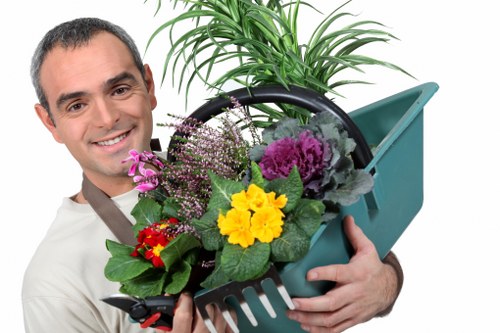
Best Plants for Chapel Hill Gardens
Choosing the right plants is key to creating a thriving garden in Chapel Hill. Here are some top choices that perform well in the local climate:
- Azaleas: These vibrant shrubs add a splash of color in the spring and thrive in Chapel Hill's acidic soil.
- Hostas: Ideal for shaded areas, hostas provide lush foliage and a variety of sizes and colors.
- Blueberries: Not only do they produce delicious fruit, but blueberries also enrich the soil with their acidic properties.
- Tomatoes: A favorite among vegetable gardeners, tomatoes flourish in the warm summers of Chapel Hill.
- Lavender: Known for its fragrant flowers and drought tolerance, lavender is perfect for adding aroma and beauty to your garden.
By selecting plants that are well-adapted to the local conditions, gardeners can ensure a more sustainable and low-maintenance garden. Incorporating native plants also supports local wildlife, including pollinators like bees and butterflies, which are essential for a healthy ecosystem.
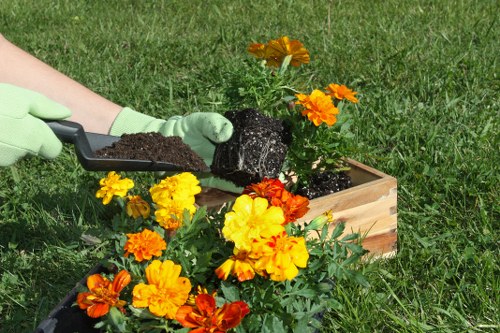
Gardening Techniques for Success
Implementing effective gardening techniques can significantly enhance the health and productivity of your garden in Chapel Hill. Here are some essential practices to consider:
- Mulching: Applying a layer of mulch helps retain soil moisture, suppress weeds, and regulate soil temperature.
- Composting: Creating compost from kitchen scraps and yard waste enriches the soil with vital nutrients.
- Crop Rotation: Rotating plant families each season prevents soil depletion and reduces the risk of pests and diseases.
- Integrated Pest Management (IPM): Using a combination of biological, cultural, and chemical methods to manage pests minimizes environmental impact.
- Pruning: Regular pruning promotes healthy growth and improves air circulation within plants.
Adopting these techniques not only leads to a more vibrant and resilient garden but also contributes to sustainable gardening practices that are beneficial for the broader community.
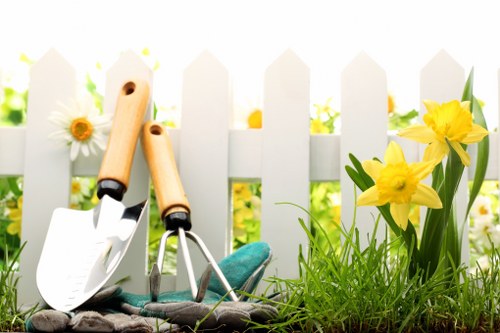
Gardening Services in Chapel Hill
For those who prefer professional assistance, Chapel Hill offers a variety of gardening services tailored to meet different needs. Whether you're looking for landscape design, maintenance, or specialized plant care, local experts can provide valuable support:
- Landscape Design: Professional designers can help you create a cohesive and aesthetically pleasing garden layout that complements your home's architecture.
- Maintenance Services: Regular maintenance, including mowing, pruning, and fertilizing, ensures your garden remains healthy and attractive throughout the seasons.
- Irrigation Systems: Installation and maintenance of efficient irrigation systems help conserve water while keeping your plants well-hydrated.
- Pest Control: Experts can provide safe and effective pest management solutions to protect your garden from harmful insects and diseases.
- Soil Testing and Amendment: Professional soil analysis can identify nutrient deficiencies and recommend appropriate amendments to optimize plant growth.
Engaging with local gardening services not only saves time and effort but also leverages the expertise of professionals who understand the unique challenges and opportunities of gardening in Chapel Hill.
Community and Gardening in Chapel Hill
Chapel Hill boasts a strong sense of community, and gardening plays a significant role in bringing neighbors together. From community gardens to local gardening clubs, there are numerous opportunities to connect with fellow enthusiasts:
Community gardens offer residents the chance to cultivate their own plots while sharing resources and knowledge. These spaces foster collaboration and create a sense of ownership and pride among participants. Additionally, local gardening clubs host events, workshops, and plant swaps, providing valuable education and networking opportunities.
Participating in community gardening initiatives not only enhances your own gardening skills but also contributes to the beautification and sustainability of the neighborhood. It's a wonderful way to give back and to create a greener, more vibrant Chapel Hill.
Seasonal Gardening Tips
Gardening in Chapel Hill requires adapting to the changing seasons to ensure year-round beauty and productivity. Here are some seasonal tips to keep your garden thriving:
- Spring: Focus on planting new annuals, pruning shrubs, and preparing your soil for the growing season.
- Summer: Maintain adequate watering, mulch to conserve moisture, and protect plants from excessive heat.
- Fall: Harvest remaining vegetables, plant perennials, and prepare your garden for winter by adding compost and mulch.
- Winter: Perform garden clean-up, plan for the upcoming year, and protect sensitive plants from frost.
By following these seasonal guidelines, you can ensure that your garden remains healthy and vibrant throughout the year, adapting to the specific climate conditions of Chapel Hill.
Gardening Resources in Chapel Hill
Access to quality resources is essential for successful gardening. Chapel Hill offers numerous resources to support gardeners, including nurseries, botanical gardens, and educational programs:
- Local Nurseries: These provide a wide selection of native and adapted plants, along with expert advice on plant selection and care.
- Botanical Gardens: Visiting local botanical gardens can inspire your own garden designs and offer insights into plant diversity and landscaping techniques.
- Workshops and Classes: Educational programs hosted by community centers and gardening organizations help gardeners improve their skills and stay updated on best practices.
- Library Resources: The local library offers a variety of gardening books, magazines, and online resources to support your gardening journey.
- Online Forums and Groups: Engaging with online communities can provide additional support, tips, and inspiration from fellow gardeners in Chapel Hill.
Utilizing these resources can greatly enhance your gardening experience, providing the knowledge and tools needed to cultivate a successful and beautiful garden.
10-15 Closest Areas to Chapel Hill for Gardening Services
Chapel Hill is surrounded by numerous charming areas that also boast excellent gardening services and vibrant horticultural communities. Here are some of the closest areas to consider:
- Durham: Just southwest of Chapel Hill, Durham offers a plethora of nurseries and gardening centers, along with community gardens and botanical attractions.
- Carrboro: Known for its eclectic community, Carrboro features unique plant shops and sustainable gardening initiatives.
- Hillsborough: This historic town provides beautiful garden spaces and professional landscaping services.
- Morrisville: A rapidly growing area, Morrisville has modern gardening services and ample green spaces for enthusiasts.
- Eden: Eden's agricultural background makes it a great spot for finding specialty plants and farming supplies.
- Raleigh: North Carolina's capital offers extensive gardening resources, including large botanical gardens and comprehensive gardening centers.
- Chapel Grove: A residential area with local nurseries and personalized gardening services.
- North Chapel Hill: Home to additional gardening shops and community garden projects.
- Pitt County: Surrounding Chapel Hill, Pitt County offers diverse gardening services catering to both urban and rural needs.
- Orange County: Just east, Orange County features beautiful landscapes and expert gardening professionals.
- Whitehead Township: With its scenic beauty, Whitehead Township provides excellent options for landscape design and maintenance.
- Franklin: A bit further out, Franklin offers specialized gardening services and a peaceful environment for gardening enthusiasts.
- Greensboro: Although a larger city, Greensboro's proximity to Chapel Hill makes it a valuable resource for extensive gardening needs.
- Smithfield: Known for its agricultural roots, Smithfield provides robust gardening support and community engagement.
- Oak Grove: A quaint area with personalized gardening services and local plant nurseries.
These nearby areas complement Chapel Hill's gardening scene, offering additional resources, services, and community opportunities for both novice and experienced gardeners.
Sustainable Gardening Practices
Embracing sustainable gardening practices is essential for maintaining the health of both your garden and the broader environment in Chapel Hill. Here are some strategies to promote sustainability:
- Water Conservation: Implementing efficient irrigation systems, such as drip irrigation, and watering during early morning hours can reduce water usage.
- Composting: Recycling organic waste into compost not only improves soil health but also reduces landfill waste.
- Native Plant Selection: Choosing native plants requires less maintenance and supports local wildlife, including pollinators.
- Integrated Pest Management (IPM): Utilizing natural predators and organic treatments minimizes the need for chemical pesticides.
- Mulching: Using organic mulch helps retain soil moisture, suppress weeds, and improve soil quality.
- Rainwater Harvesting: Collecting rainwater for garden use reduces dependence on municipal water sources.
By incorporating these sustainable practices, gardeners in Chapel Hill can create eco-friendly gardens that are both beautiful and beneficial to the environment.
Gardening for Wildlife
Gardening in Chapel Hill provides an excellent opportunity to support local wildlife and promote biodiversity. Here are some ways to create a wildlife-friendly garden:
- Plant Diversity: Incorporate a variety of plants to provide food and shelter for different species of birds, insects, and other wildlife.
- Pollinator Gardens: Plant flowers that attract bees, butterflies, and other pollinators essential for plant reproduction.
- Water Sources: Install birdbaths or small ponds to provide drinking water for animals.
- Habitat Structures: Add birdhouses, bat boxes, and insect hotels to create safe habitats for various creatures.
- Avoid Pesticides: Reducing or eliminating pesticide use protects beneficial insects and prevents contamination of water sources.
Creating a wildlife-friendly garden not only enhances the beauty of your outdoor space but also plays a vital role in maintaining the ecological balance in Chapel Hill.
Gardening Events and Workshops
Chapel Hill hosts a variety of gardening events and workshops throughout the year, providing opportunities for learning and community engagement. Participating in these events can enhance your gardening knowledge and connect you with fellow enthusiasts:
- Spring Plant Sales: Purchase seasonal plants and receive expert advice on planting and care.
- Workshops: Attend sessions on topics such as organic gardening, landscape design, and pest management.
- Garden Tours: Explore beautiful local gardens and gain inspiration for your own gardening projects.
- Plant Swaps: Exchange plants and gardening supplies with other community members.
- Educational Seminars: Learn about sustainable gardening practices, native plants, and environmental conservation.
Staying informed and actively participating in local gardening events can significantly enhance your gardening skills and foster a sense of community in Chapel Hill.
Conclusion: Embrace the Garden Lifestyle in Chapel Hill
Gardening in Chapel Hill offers a rewarding and enriching experience, blending beauty, sustainability, and community. By understanding the local climate, selecting appropriate plants, and adopting best gardening practices, residents can cultivate stunning gardens that thrive year-round.
Whether you choose to garden independently or seek professional services, Chapel Hill provides ample resources and support to help you succeed. Embracing sustainable and wildlife-friendly practices not only enhances your garden but also contributes to the overall health and vitality of the local environment.
Ready to transform your outdoor space? Contact us today to begin your gardening journey in Chapel Hill and experience the joys of cultivating your own personal oasis.
